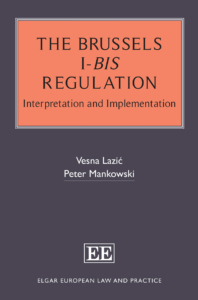Views
Islamic Marriage and English Divorce – a new Decision from the English High Court
In England, almost all married Muslim women have had a nikah, a religious celebration. By contrast, more than half of them have not also gone through a separate civil ceremony, as required under UK law. The often unwelcome consequence is that, under UK law, they are not validly married and therefore insufficiently protected under UK law: they cannot claim maintenance, and they cannot get a divorce as long as the marriage is viewed, in the eyes of the law, as a nullity.
The government has tried for some time to remedy this, under suspicious gazes from conservative Muslims on the one hand, secularists on the other. A 2014 report (the ‘Aurat report’), which demonstrated, by example of 50 cases, the hardships that could follow from the fact that nikahs are not recognized, found attention in the government party. An independent review into the application of sharia law in England and law, instigated by Theresa May (then the Home Secretary) in 2016 and published earlier this year, recommended to ensure that all Islamic marriages would also be registered; it also recommended campaigns for increased awareness.
Such steps do not help where the wedding already took place and has not been registered. A new decision by the High Court brings partial relief. Nasreen Akhter (who is a solicitor and thus certainly not an uneducated woman ignorant of the law) asked to be divorced from her husband of twenty years, Mohammed Shabaz Khan. Khan’s defense was that the marriage, which had been celebrated as a nikah in west London, existed only under Islamic, not under UK law, and therefore divorce under UK law was not possible. Indeed, up until now, the nikah had been considered a non-marriage which the law could ignore, because it did not even purport to comply with the requirements of English law. The High Court was unwilling to presume the lived marriage as valid. However, drawing at length on Human Rights Law, it declared the marriage void under sec 11 of the Matrimonial Causes Act 1973 and granted the wife a decree of nullity. This has important consequences: Unlike a non-marriage, a void marriage allows a petitioner to obtain financial remedies.
The decision represents a huge step towards the protection of women whose Islamic marriages are not registered. It makes it harder for men to escape their obligations under civil law. At the same time, the decision is not unproblematic: it refuses recognition of an Islamic marriage as such, while at the same time, under certain conditions, treating it like a recognized marriage. In all likelihood, only registration will create the needed certainty.
The decision is here.
Much-awaited US Supreme Court decision has been rendered: Animal Science Products, Inc. v. Hebei Welcome Pharmaceutical Co. Ltd.
The decision is available here and further documentation is available here. I would also like to refer to previous posts by fellow editors here and here. The US Supreme Court held that: “A federal court determining foreign law under Federal Rule of Civil Procedure 44.1 should accord respectful consideration to a foreign government’s submission, but the court is not bound to accord conclusive effect to the foreign government’s statements.”
In a nutshell, the US Supreme Court said that the weight to be given to foreign government statements depends on the circumstances of the case. In particular, it notes that “[t]he appropriate weight [a federal court determining foreign law should give to the views presented by a foreign government] in each case, however, will depend upon the circumstances; a federal court is neither bound to adopt the foreign government’s characterization nor required to ignore other relevant materials. No single formula or rule will fit all cases, but relevant considerations include the statement’s clarity, thoroughness, and support; its context and purpose; the transparency of the foreign legal system; the role and authority of the entity or official offering the statement; and the statement’s consistency with the foreign government’s past positions.”
One thing of note is that the US Supreme Court refers to Société Nationale Industrielle Aérospatiale v. United States Dist. Court for Southern Dist. of Iowa, 482 U. S. 522, which is a very important case in the context of the Hague Evidence Convention.
The concept of ‘right of access’ under Brussels II bis encompasses grandparents
In the judgment C-335/17 of 31 May 2018, the CJEU confirms that the autonomous concept of ‘right of access’ under Brussels II bis Regulation encompasses the rights of access of grandparents to their grandchildren. Read more
News
Out Now: The Brussels I-bis Regulation (Lazic & Mankowski)
Vesna Lazic and Peter Mankowski, The Brussels I-bis Regulation: Interpretation and Implementation, Edward Elgar 2023 (602 pp)
This impressive book on the Brussels I-bis Regulation has just been published. It results from a project headed by Vesna Lazic (Utrecht University/T.M.C. Asser Institute) and the late Peter Mankowski (formerly University of Hamburg), in co-operation with Lucia Pein (Hamburg University), entitled ‘Regulation Brussels Ia: a standard for free circulation of judgments and mutual trust in the European Union’ (JUDGTRUST) funded by the European Commission’s Justice Programme (JUST-AG-2017/JUST-JCOO-AG-2017). The research for this project consisted among others of a questionnaire and national reports from all the Member States on the application of the Regulation. This book provides an extensive overview of the CJEU rulings and analysis of case law, which will be of great importance for future reference and the ongoing evaluation and revision of the Brussels I-bis Regulation.
Anchor defendants and exclusive distribution agreements under Article 8(1) of the Bru I bis Regulation – CJEU in Beverage City Polska, C-832/21
How does the anchor defendant mechanism operate in the realm of EU trade marks and actions on trade mark infringement? Is the existence of an exclusive distribution agreement between the defendants sufficient to rely on this mechanism? Those are the questions that the Court of justice addresses in its judgment handed down this morning in the case Beverage City Polska, C-832/21.
Lecture by Prof. Dr. Horatia Muir Watt: “Ecological Jurisprudence: The Shape of Legality at its Own Last Frontier (a Private International Law Approach)” on 27 October 2023 at 17:00 (CEST) at Maastricht University
 On 27 October 2023, the Department of Private Law of Maastricht University (the Netherlands) is hosting a lecture by Prof. Dr. Horatia Muir Watt, Professor at the Sciences Po Law School (Paris), entitled: “Ecological Jurisprudence: The Shape of Legality at its Own Last Frontier (a Private International Law Approach)” at 17:00 (CEST time). This event will take place onsite and in English. For more information, click here.
On 27 October 2023, the Department of Private Law of Maastricht University (the Netherlands) is hosting a lecture by Prof. Dr. Horatia Muir Watt, Professor at the Sciences Po Law School (Paris), entitled: “Ecological Jurisprudence: The Shape of Legality at its Own Last Frontier (a Private International Law Approach)” at 17:00 (CEST time). This event will take place onsite and in English. For more information, click here.



